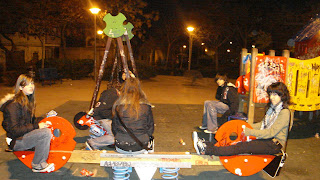It was premiere the 24 May, 2007.
The series is about a boarding school beginning a new year in “The black lagoon”. This boarding school is in a forest, where study the children of the most influential families.
This year, comes new pupils: Marcos Novoa Pazos and her sister Paul
 a, they had to begin a new life because their parents have disappeared, supposedly, in a ship. And Hector, the boarding school’s director, turns into the legal tutor of them.
a, they had to begin a new life because their parents have disappeared, supposedly, in a ship. And Hector, the boarding school’s director, turns into the legal tutor of them.Carolina, other pupil, loves Marcos, but she has boyfriend. And Victoria, her best friend, loves Iván, the Carolina’s boyfriend.
The protagonists are five: Marcos, Carolina, Ivan, Roque and Victoria.
Comes a new cleanliness girl, María, nobody knows her past, and they don’t know that has gone away of a psychiatric hospital and comes looking for her son. She discovers her son, Iván. She tries to approach him but he despises her for her profession.
Dies a teacher because was very near for to discover the mystery conceals “the black lagoon”. The pupils try too to discover it, because Alfonso, the teacher dead, talks with them before and he tells everything. The pupils discover that before the boarding was an orphanage that closed per the strange disappearance of five children. And discover the corpses of the five pupils, those of Alfonso and a video in which deal with organs. They don’t know that will traverse a serious danger per an organization that looks for exchequers hidden in the boarding school and per another that deals with organs. Dies one of pupils too and the organizations want to kill the rest. The enemy is more near what they believe. Because in this boarding school nothing is what seems, and nobody is who says to be.

CREDITS:
http://www.youtube.com/watch?v=HOMm0sSZbWc
http://www.antena3.com/PortalA3com/El-Internado/P_84035
http://es.wikipedia.org/wiki/El_Internado
http://www.elinternado.webforo.net/forum/index.php?page=53
and me.



































